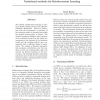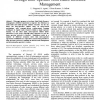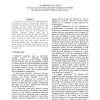1233 search results - page 53 / 247 » Feudal Reinforcement Learning |
JMLR
2010
13 years 2 months ago
2010
We consider reinforcement learning as solving a Markov decision process with unknown transition distribution. Based on interaction with the environment, an estimate of the transit...
ICC
2007
IEEE
14 years 2 months ago
2007
IEEE
— This paper proposes a two-layer Joint Radio Resource Management (JRRM) framework to improve the efficiency in multi-radio and multi-operator cellular scenarios. On the one hand...
ATAL
2007
Springer
14 years 2 months ago
2007
Springer
This paper presents the dynamics of multiple reinforcement learning agents from an Evolutionary Game Theoretic (EGT) perspective. We provide a Replicator Dynamics model for tradit...
CIMCA
2006
IEEE
14 years 1 months ago
2006
IEEE
In this paper, a distributed and adaptive approach for resource discovery in peer-to-peer networks is presented. This approach is based on the mobile agent paradigm and the random...
NN
2007
Springer
13 years 7 months ago
2007
Springer
Reinforcement learning is based on exploration of the environment and receiving reward that indicates which actions taken by the agent are good and which ones are bad. In many app...




